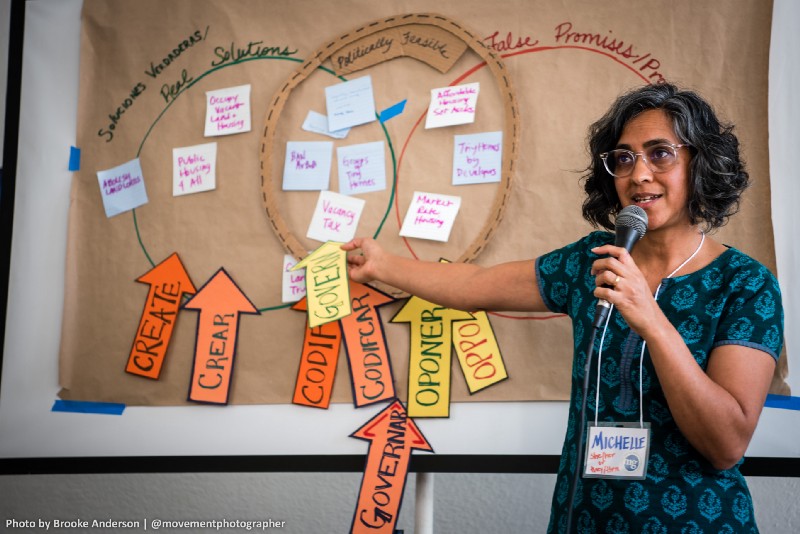Interview By Angela Aguilar
Late last year after 14 years as a staff collective member at Movement Generation, Michelle Mascarenhas stepped into her new role as an MG board member and more recently into a position at the Sierra Club as National Campaigns Director. In this interview, Michelle leaves us gems of wisdom to ponder over as only a brilliant and bold movement strategist for these times can.
Edited for length and clarity
Movement Generation: How has the movement shifted in your time at MG and what role has MG played in that shift?
Michelle Mascarenhas: It’s been 14 years since the first MG Justice and Ecology Project retreat. (I was 3 months pregnant!) At that time our folks in the social movement Left were not clocking climate. None of us were talking climate in a political way. Hurricane Katrina had just hit a few years prior, and we all saw that the movement was not able to respond in a strong way. I think about that moment as a really important moment for MG. We influenced the movement to show that this was critical terrain that our folks needed to lead on and we continue to be a political home for so many people on that front.
It’s been a beautiful and powerful thing to accompany people and their own processes, and then write down a framework that helps people make sense of their own ideas. I don’t think the Just Transition framework is a new thing for frontline communities. It’s just naming and drawing connections in a way that makes it make sense and speaks to what’s already happening. And so, it’s really an honor to get to accompany people in that process and see people so excited and woken up around that. And then the other thing that’s happened in the movement is that now there’s not an organizer alive on the planet that doesn’t think climate and ecological justice is interrelated to the issues they work on. When we started, we had to really stir things up about how bad it was gonna get. Now it’s like, oh, it’s all here. The fires, droughts, heatwaves, hurricanes, melting ice and permafrost, expansion of disease, the displacement, the eco-apartheid.

“Rolling as a collective meant that we could make big interventions. It allowed me and all of us to be bold”
MG: Think about who you were when you first came to MG? How has MG changed you?
MM: I came to MG as –a lot of us OG’s will say — as like a wounded warrior of the movement. MG was a place where we were good to each other and we could focus on the political struggle. I could assert ideas and then they were made better by the collective. Ideas would be transformed in some cases, and then I would be part of implementing them and seeing them through with the collective at my back. Or alongside other people in the collective. I think that has been really powerful as a model and as a practice. And some of how I’ve changed through that, through those years, is that I’ve been able to see more clearly what the things are that I bring. What do I like to do? You know, what am I good at? And then having faith. Like, being able to see those things and name them — not in an egotistical way — just more like owning it. Rolling as a collective meant that we could make big interventions. It allowed me and all of us to be bold, you know? Like supporting the start of the Climate Justice Alliance. Now I can see my role in that more than I did in the beginning.
MG: What were some of your learnings from participating in the Black Land and Liberation Initiative (BLLI) as a non-Black person?
In relation to my identity as a person of South Asian descent, it helped me understand what it meant to be of a people whose bodies played a particular role in the colonial project both in Asia and in East Africa. My great grandfather was one of the first Indian judges under Portuguese rule in Goa. All four of my grandparents were either born or spent some of their childhood in Uganda or Kenya, which means that my great grandparents were there as tobacco merchants or bridge builders or bureaucrats. The role my grandparents and parents have played is to be white-collar workers or to facilitate the extraction of resources to benefit the few (mostly white wealthy men). And so my family benefited from that in ways. It’s complicated — it’s not like my family wanted to leave this amazing, gorgeous, paradise but of course, extraction made it necessary. Understanding that my ancestors’ bodies were used in that way, it felt important to me to play a role that I have been in a way prepared for. To reverse that flow of resources and to be a channel for those resources to flow in the other direction. To restore justice. I’m going to use those skills to facilitate returning power and resources and lands specifically, and to support Black communities taking land stewardship back. Another thing I learned was how whiteness shows up to exert power over money, and how whiteness brings assumptions and givens about how things should work. The fuckery of whiteness –something that many Black folks see without needing anybody to point it out– was laid bare for me. I learned so much from the integrity of Black women, feminist organizers to not accept any shenanigans.
MG: If there’s one strategic priority that you want folks in the MG ecosystem to pivot towards in the current moment, what is it?
MM: Can I say two things? First, I think finding ways to really invest in movement infrastructure for just transition at the bioregional level so that these place-based just transition coalitions like Our Power Richmond or the Oregon Just Transition Alliance can happen everywhere. How are we building the governance infrastructure at the movement level? And how can that help to map out the governance structures to govern watersheds and foodsheds and trade sheds and work? That’s what people need to be investing in. Don’t move things by yourself! Move things with others in a coordinated way with that framework in mind. And then the second part of that is to play big. Like, don’t make ourselves small. Frontline communities need to help design the movement architecture. What do we need national big green organizations to do? How should resources be allocated? Our movement needs to write the big budget rather than letting philanthropy dictate that. And also what vehicles do we need to support organizing people through sectors of society, in the roles they play in coordination with a just transition strategy? As child-care providers, teachers, care workers, lawyers, energy engineers, and financiers –we have people who want to help lead a just transition. What organizational forms do we need to engage them? And how can they leverage their capacities for just transition at the bioregional level?
MG: What have you loved or hated about having MG in your backyard?
MM: MG has helped raise my kids. The kids were always there, at retreats, planning committee meetings. It’s been a gift to also provide radical hospitality, housing people when they came from out of town. So many amazing people have stayed in that little cottage [in my backyard], a lot of them connected to MG. Folks from Alaska to Miami to L.A. co-op developers. Half of the staff of Ironbound Community Corporation in New Jersey a couple of years ago. We’d often have dinner together with my family so my kids were surrounded by radical and heartful organizers over the years. They’re tired of it now! But it was really important. I think they grew up in the movement because it was always right there.

